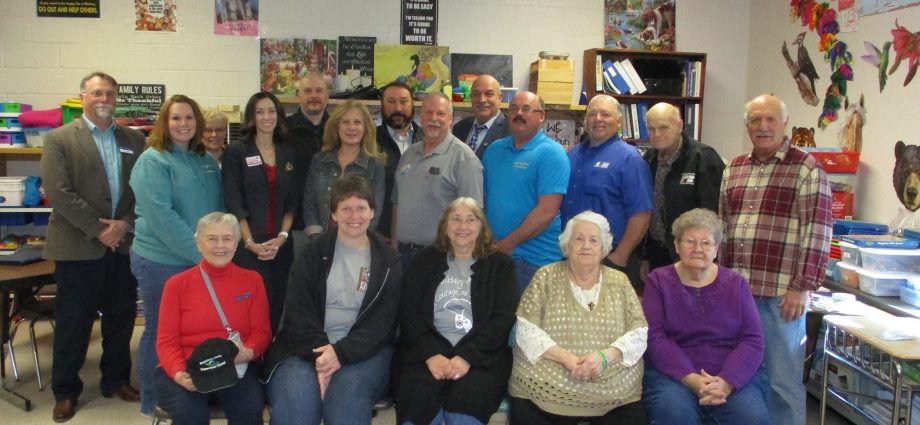Participants in a meeting with legislators and candidates hosted by the Susquehanna County Farm Bureau on April 10 included (seated, from left) Lillian Theophanis, Aileen Shay, Emma Hinkley, Donna Williams, Mickey Klim, (standing) Mark Madden, Jennifer Remy, Megan Martin, Rep. Jonathan Fritz, commissioner Judy Hershel, Mike Marabell, Dave Darrow, Alan Hall, Bill Shay, Jim Barbour, Joe Decker, and Dave Deleon.
Story and photo by Rick Hiduk
(originally published in the Susquehanna County Independent – http://www.susqcoindy.com/PS/)
The custom of bringing elected officials to the table for a discussion with members of the Susquehanna County Farm Bureau prior to the start of Farm & Home Day continued this year at Elk Lake High School. Susquehanna County Farm Bureau president Dave Deleon welcomed those in attendance and asked attendees to identify themselves. Elected officials included Rep. Jonathan Fritz, and Susquehanna County commissioners Betsy Arnold, Alan Hall and Judy Hershel. Also joining the legislative panel were Susquehanna County commissioner candidate Dave Darrow and Megan Martin, a state candidate for the Commonwealth Court.
Bureau members Bill Shay and vice president Jim Barbour took turns bringing topics to the table, which included milk pricing, broadband and internet issues, road maintenance and bridge replacement, restrictions by PennDOT on the use of farm equipment on roadways, the risks involved with allowing the development of solar farms, and the continued push to get whole milk back into all county schools.
Meeting participants were in agreement that the state and federal formulas for milk pricing are so confusing that nobody seems to have a real grasp on why checks to dairy farmers fluctuate greatly from one month to another.
“Even dairy farmers can’t keep up with the process,” Barbour stated.
He and Shay have been attending meetings in Harrisburg and asking legislators to remedy the issues, but Shay remarked that the more people they get to talk to, “you come out more confused than when you went in.”
“We want our milk checks to be more transparent,” said Donna Williams, a former Bureau president at the county level. Among the line items she wants included is information on where the milk is processed.
There are a dwindling number of dairy processors in Pennsylvania, exacerbated by the closure last year of Readington Farms, which used to buy much of its milk from Susquehanna County. Since then, the majority of the locally produced milk is being trucked to Maryland and Virginia and facilities owned by DFA (Dairy Farmers of America – formerly DairyLea).
A related issue is the over-order premium that consumers in the state have paid at the retail level for milk that is both produced and processed in Pennsylvania. The law was established in 1988, a year of severe drought, to provide some financial assistance to dairy farmers. According to an op-ed published in Lancaster Farming in December 2022, approximately 70 percent of the milk produced in Pennsylvania at that time stayed in the state. Now, between 60 and 70 percent of locally produced milk is being processed elsewhere. Some of it comes back to the Commonwealth to be sold, and the rest leaves the market permanently.
The problem Barbour cited is that the over-order premiums are still going to the processors regardless of where they are. “They collect the premium, but they don’t have to give it back,” he remarked. “The processors know they have been getting away with this for a long time.”
Mike Marabell, sitting in for Congressman Dan Meuser, agreed that it is a “very messed up process” and that Meuser’s team is committed to finding a solution. “We are going to make it a priority,” he stated. In the meantime, Marabell noted, they are finding that dairy farmers from one county to another cannot agree on how they would like the formula to work.
On the issue of limited broadband, the commissioners asked participants to be patient, as several initiatives are underway simultaneously to improve internet connections, especially for businesses. Commissioner Herschel said that the struggle is justifying the cost for providers to build “the middle mile” to connect more homes but that federal funds have been made available to help, and Susquehanna County is working with the Progress Authority on an engineering study. Starlink has shown great promise in neighboring Wyoming County, Commissioner Hall added, and is another option to consider. The signal is provided from a satellite at a lower orbit and therefore more reliable than other offerings.
Rep. Fritz also mentioned advances in microwave transmission that perform well in areas with varied terrain. “We’re going to get there,” he maintained.
Shay then brought up inconsistencies in weight restrictions for farm equipment, including milk haulers, to access or cross certain highways, as well as restrictions on moving milk during state declarations of disaster such as snow storms. To the former, Hall agreed that, for all the talk there is about road safety and the environment, it makes no sense to force a driver to travel 40 miles or more when the trip could be as short as 10 miles. Deleon related that PennDOT has expressed a willingness to meet with Bureau members to discuss their concerns, but two previously scheduled meetings were scuttled due to bad weather.
